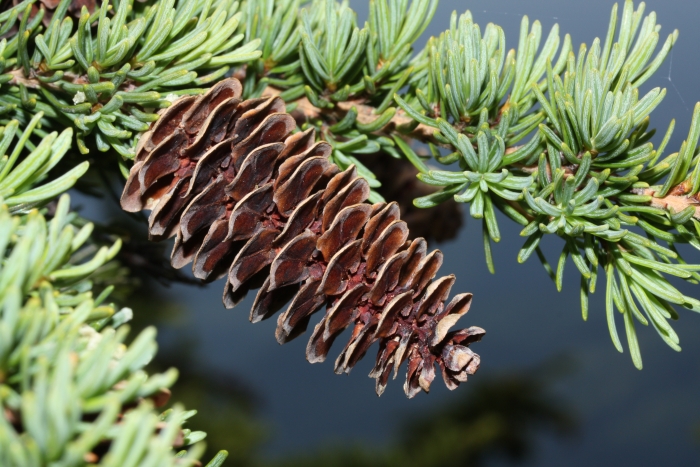Mountain Hemlock
(Tsuga mertensiana)
Mountain Hemlock (Tsuga mertensiana)
/
/

Walter Siegmund (talk)
CC BY-SA 3.0
Image By:
Walter Siegmund (talk)
Recorded By:
Copyright:
CC BY-SA 3.0
Copyright Notice:
Photo by: Walter Siegmund (talk) | License Type: CC BY-SA 3.0 | License URL: https://creativecommons.org/licenses/by-sa/3.0 | Uploader: Wsiegmund | Publisher: Wikimedia Commons | Title: Tsuga_mertensiana_9253.JPG | Notes: {{Information |Description={{en|1=''Verbena hastata'', Verbenaceae, Blue Vervain, Swamp Verbena, inflorescences. }} {{de|1=''Verbena hastata'', Verbenaceae, Blaue Verbene, Infloreszenzen. }} |Source={{own}} |Author=H. Zell |Date=2009-07-29 |Permission= |








































































Estimated Native Range
Summary
Tsuga mertensiana, commonly known as Mountain Hemlock, is an evergreen conifer native to subalpine zones and mountainous regions of the Northwestern USA and Canada, including the Cascade and Coastal ranges. It can reach heights of 20 to 40 meters (66 to 131 ft) with a trunk diameter of up to 2 meters (6 ft 7 in). The bark is thick, square-cracked or furrowed, and ranges from purplish-brown to gray. The needles are distinctive, being needle-like, soft, blunt-tipped, and slightly flattened, with a pale glaucous blue-green color above and two broad bands of bluish-white stomata below. Uniquely, they also have stomata on the upper surface and are arranged spirally around the shoot. Mountain Hemlock is notable for its conical form and dense, symmetrical crown.
This species is valued for its aesthetic appeal, particularly its blue-green foliage and its resilience to harsh weather conditions, making it a favored ornamental tree in regions that can mimic its native habitat requirements. It is often used as a specimen tree in native plant landscapes and in areas like northern Great Britain and Scandinavia. While it has a very slow growth rate, especially when young, and is sensitive to urban air pollution, it thrives in loose, coarse-textured, well-drained soils rich in organic matter. In its preferred environments, it requires high amounts of water, especially in areas prone to summer drought, and full sun to develop optimally. However, it is not commonly used in urban settings due to its slow growth and pollution sensitivity.CC BY-SA 4.0
This species is valued for its aesthetic appeal, particularly its blue-green foliage and its resilience to harsh weather conditions, making it a favored ornamental tree in regions that can mimic its native habitat requirements. It is often used as a specimen tree in native plant landscapes and in areas like northern Great Britain and Scandinavia. While it has a very slow growth rate, especially when young, and is sensitive to urban air pollution, it thrives in loose, coarse-textured, well-drained soils rich in organic matter. In its preferred environments, it requires high amounts of water, especially in areas prone to summer drought, and full sun to develop optimally. However, it is not commonly used in urban settings due to its slow growth and pollution sensitivity.CC BY-SA 4.0
Plant Description
- Plant Type: Tree
- Height: 10-20 feet
- Width: 6-10 feet
- Growth Rate: Slow
- Flower Color: N/A
- Flowering Season: Non-Flowering
- Leaf Retention: Evergreen
Growth Requirements
- Sun: Full Sun, Part Shade
- Water: Medium
- Drainage: Medium
Common Uses
Bird Garden, Deer Resistant, Erosion Control, Fragrant, Low Maintenance
Natural Habitat
Subalpine zones and mountainous regions of the Northwestern USA and Canada, including the Cascade and Coastal ranges
Other Names
Common Names: Alpine Hemlock, Black Hemlock, Pruche De Patton, Pruche Subalpine, Tsuga Subalpin, Berghemlock
Scientific Names: , Tsuga mertensiana, Hesperopeuce mertensiana, Abies mertensiana, Tsuga canadensis var. macrophylla, Abies pattonii, Abies taxifolia, Picea mertensiana, Pinus mertensiana, Tsuga mertensiana f. argentea
GBIF Accepted Name: Tsuga mertensiana (Bong.) Carrière